Recognizing the Need for Neuropsychological Assessment
Neuropsychological testing plays a vital role in evaluating brain functions and identifying underlying neurological or psychological conditions. If you notice changes in your loved one’s memory, behavior, or cognitive abilities, understanding the signs that warrant professional assessment can be crucial for early diagnosis and effective intervention.
Indicators That Suggest Your Loved One May Need Neuropsychological Testing
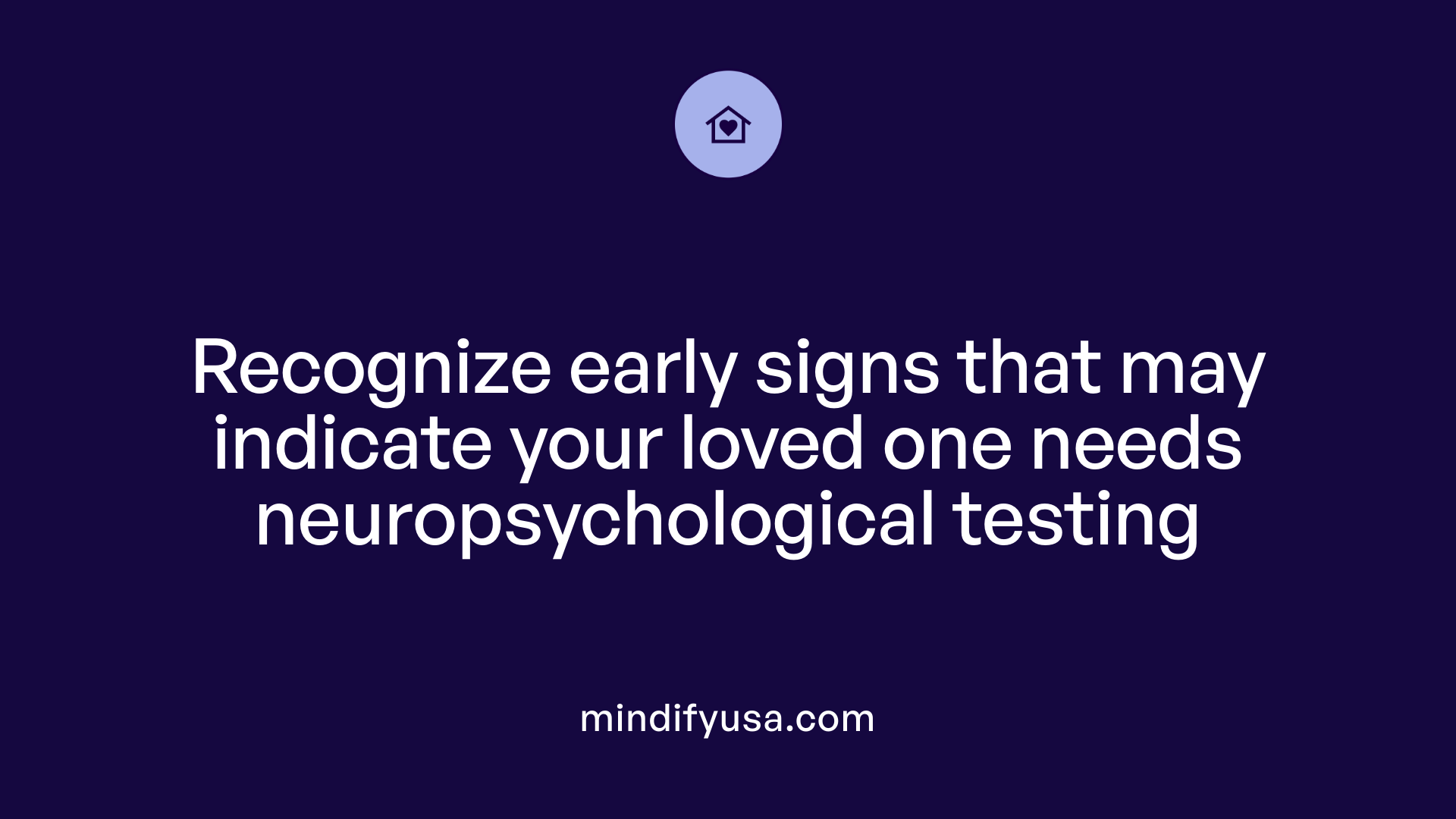 Neuropsychological testing is a valuable tool for understanding how well a person’s brain functions and helps identify specific cognitive or behavioral issues. Recognizing early signs that suggest a loved one might benefit from testing can be crucial for timely diagnosis and intervention.
Neuropsychological testing is a valuable tool for understanding how well a person’s brain functions and helps identify specific cognitive or behavioral issues. Recognizing early signs that suggest a loved one might benefit from testing can be crucial for timely diagnosis and intervention.
How can I recognize signs that my loved one may need neuropsychological testing?
Signs that may indicate your loved one needs neuropsychological testing include noticeable changes in memory, such as forgetting recent events, important dates, or how to complete familiar tasks. If your loved one becomes increasingly confused about time or place, this could be a cause for concern.
Problem-solving difficulties, poor judgment, and withdrawal from social activities are other important indicators. Mood swings, increased irritability, depression, or personality changes may also be present. Repetitive questions, misplacing items, and unusual or erratic behaviors can serve as warning signals.
Language and visuospatial skills may decline, leading to trouble understanding and using language or navigating familiar environments. Challenges with executive functions—such as managing finances, organizing daily activities, or planning—are significant red flags.
If these symptoms impact daily life or progress over time, it’s essential to consult with healthcare professionals. They can evaluate whether neuropsychological testing is appropriate to identify the underlying causes and plan effective interventions.
Why is testing important?
Testing provides detailed insights into how specific brain functions are affected. It helps differentiate between conditions like normal aging, neurological diseases such as Alzheimer’s, or mental health issues.
The assessments also guide treatment strategies, including therapy options, lifestyle modifications, or safety measures. Early identification of problems can improve quality of life and provide peace of mind for families.
When to consider testing?
Consider neuropsychological testing when there are persistent or worsening issues with memory, attention, language, or behavior. Other signs include difficulty with daily tasks, decreased independence, or safety concerns such as wandering or forgetfulness.
The process involves questionnaires, interviews, and tasks designed to evaluate various mental functions. Professionals interpret the results to determine the next steps.
Being aware of these signs and acting promptly can make a significant difference in managing cognitive health and addressing underlying conditions swiftly.
What Are the Main Goals of Neuropsychological Testing?
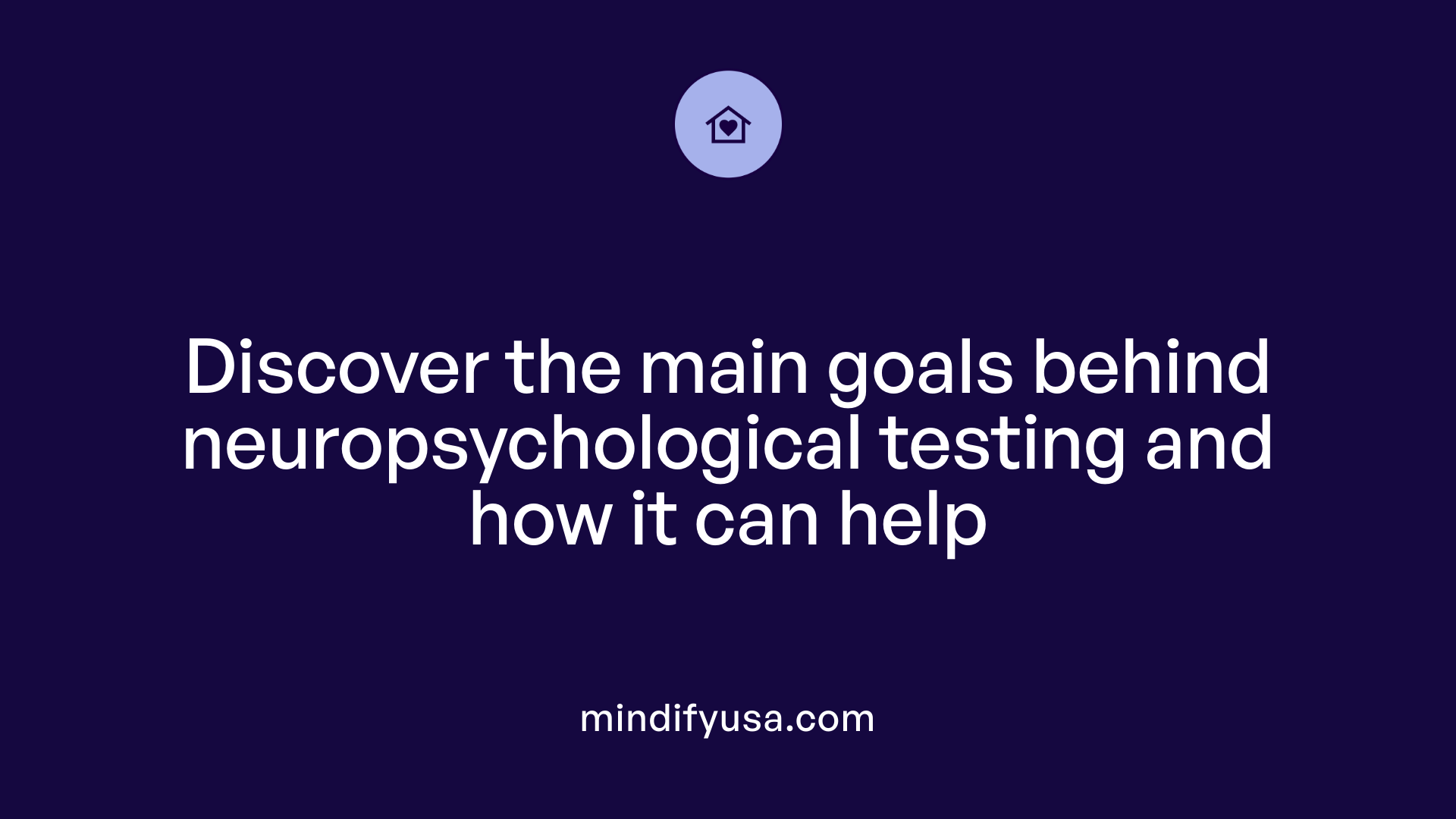
Assessment of Mental Functions
Neuropsychological testing provides a detailed look at various mental functions, including memory, language, attention, reasoning, and problem-solving skills. These tests evaluate how well different parts of the brain are working, identifying areas of strength and weakness.
Differentiating Causes of Cognitive Issues
One of the primary goals is to determine what is causing cognitive problems. Whether the issues stem from neurological illnesses like Alzheimer’s disease, stroke, traumatic brain injury, or psychiatric conditions such as depression or anxiety, these assessments help distinguish among different potential causes.
Establishing Baselines for Monitoring Over Time
Early evaluations, especially in children or young adults, establish a baseline of cognitive functioning. Future assessments can then measure changes over months or years, useful for tracking progression of conditions or the impact of treatments.
Supporting Diagnosis of Neurological and Psychiatric Disorders
While neuropsychological tests do not directly diagnose conditions, they provide valuable information that supports diagnosis. Tests can help identify specific deficits linked to disorders like dementia, epilepsy, Parkinson’s disease, or learning disabilities, leading to more accurate and earlier diagnosis.
Guiding Treatment and Intervention Plans
The insights gained from testing inform personalized treatment plans. Healthcare providers can recommend therapies such as occupational or speech therapy and suggest accommodations at school or work. The results also help tailor strategies to maximize a person’s cognitive strengths.
Legal and Forensic Applications
In legal settings, neuropsychological assessments establish a person’s cognitive or behavioral capacity. This can influence decisions about competence, guardianship, or return-to-work readiness, especially following brain injury or mental health crises.
| Purpose | Description | Typical Outcomes |
|---|---|---|
| Mental Function Evaluation | Measures memory, language, attention, reasoning, etc. | Identifies strengths and weaknesses in thinking abilities |
| Cause Differentiation | Differentiates between neurological, psychiatric, or age-related issues | Clarifies underlying causes of cognitive or emotional symptoms |
| Baseline Setting | Establishes initial level of functioning | Monitors change over time for diagnosis or treatment effectiveness |
| Support for Diagnosis | Provides data to assist in diagnosing brain or mental health disorders | Aids early and accurate diagnosis |
| Treatment Planning | Guides specific interventions and accommodations | Enhances therapy effectiveness and life management |
| Legal and Forensic Uses | Assesses capacity or competency | Influences legal decisions and employment considerations |
These comprehensive evaluations are essential tools for understanding brain health across all ages. They are performed in clinical settings, often involving a mix of interviews, questionnaires, and a variety of standardized tests tailored to the individual’s background and needs.
In summary, neuropsychological testing aims to evaluate mental reasons, differentiate among causes, establish progress benchmarks, support diagnoses, guide treatments, and serve legal purposes, thus facilitating a holistic approach to managing cognitive and emotional health.
When and Why Neuropsychological Testing Is Recommended
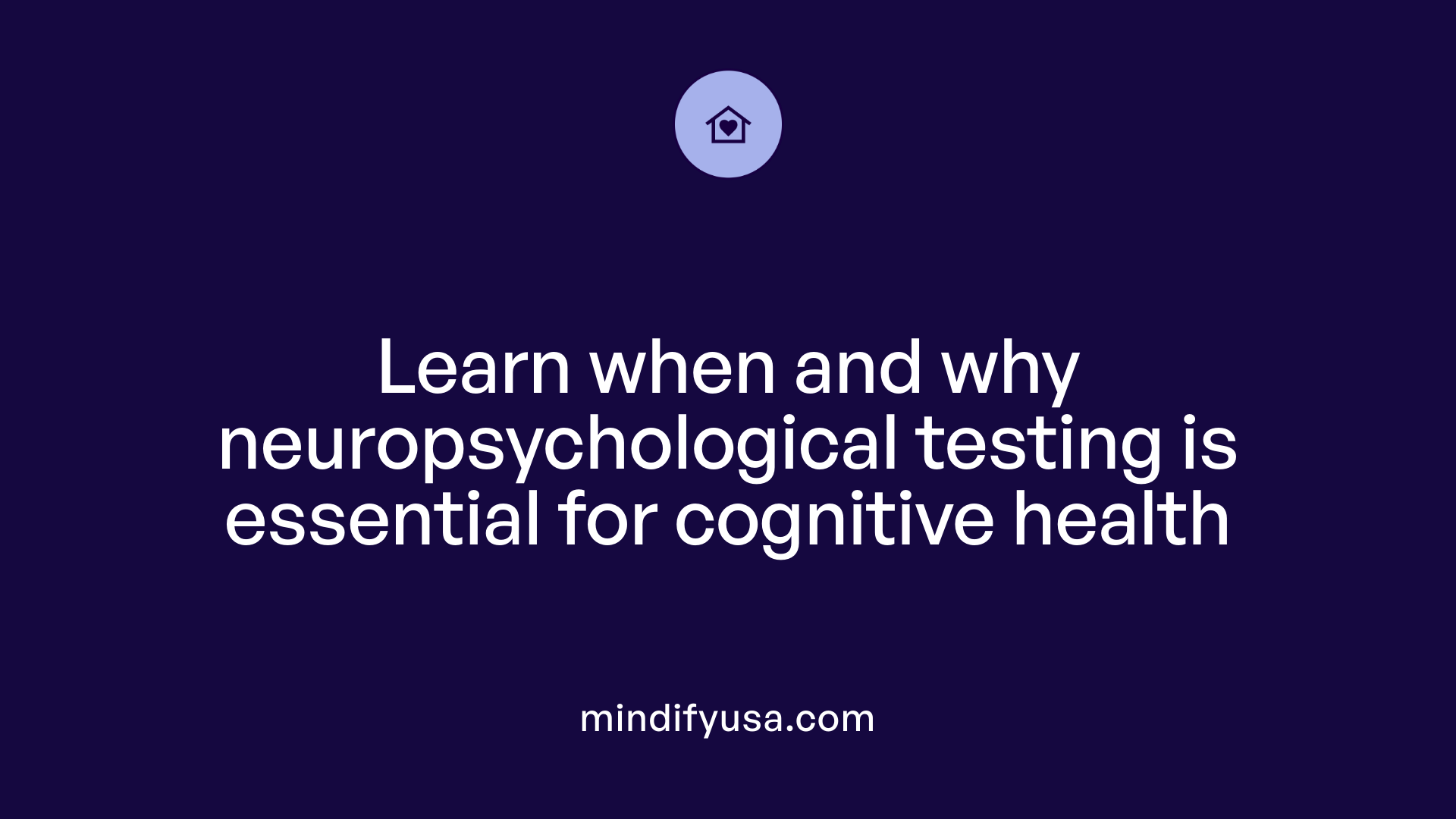
When is neuropsychological testing recommended?
Neuropsychological testing is often advised when there are noticeable and unexplained changes in a person’s mental functions or behavior. These indicators can include difficulties with memory, language, or communication, as well as shifts in personality or judgment.
People might experience forgetfulness that interferes with daily life or show changes in how they process information. Some may have trouble organizing tasks, making decisions, or recognizing familiar faces, which may signal underlying issues needing thorough evaluation.
Testing becomes crucial in cases where diagnosing or differentiating conditions like Alzheimer’s disease, mild cognitive impairment, brain injuries, or neurological disorders is challenging through basic clinical assessments alone. It helps distinguish between normal aging and more serious conditions.
Furthermore, neuropsychological assessments are valuable when mental health, emotional issues, or other factors complicate the picture and affect cognition.
They are also recommended for establishing a clear baseline of cognitive functioning. Such baseline testing can be particularly important before engaging in high-risk activities like contact sports or brain surgery, or if there is a family history of neurodegenerative diseases.
In clinical settings, if a patient exhibits symptoms such as confusion, poor judgment, personality changes, or organizational difficulties, neuropsychological testing provides detailed insights.
It can inform treatment strategies, monitor recovery progress after injuries, and help evaluate decision-making abilities, including capacity to manage personal affairs or financial responsibilities.
Overall, whenever there is a need for a comprehensive evaluation of mental and emotional functioning to aid in diagnosis, management, or legal decisions, neuropsychological testing is highly indicated.
How Neuropsychological Evaluations Contribute to Diagnosing Brain-Related Conditions
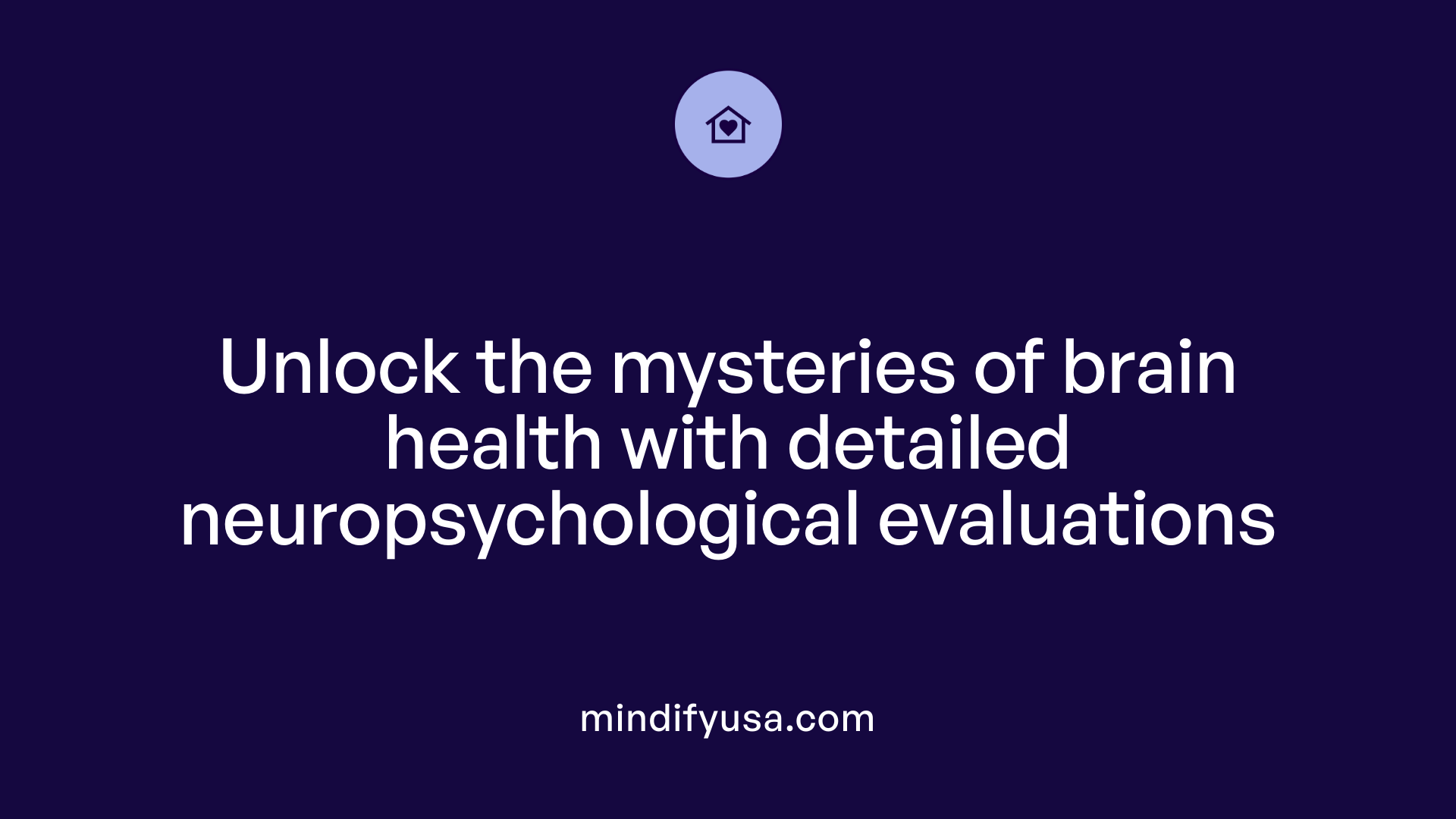
How can neuropsychological evaluations aid in diagnosing brain-related conditions?
Neuropsychological evaluations provide detailed insights into a person's mental functioning by assessing various cognitive skills. These assessments include memory, attention, language, reasoning, and executive functions.
By carefully analyzing performance across different tasks, clinicians can distinguish between normal aging processes and the early signs of neurological diseases. For example, if memory decline exceeds typical age-related changes, it could indicate early dementia.
These tests are particularly helpful in identifying conditions like Alzheimer’s disease, brain tumors, stroke, traumatic brain injuries, and other neurodegenerative disorders. They also differentiate psychiatric conditions such as depression and anxiety that sometimes mimic neurological symptoms.
The diagnostic process benefits from the comprehensive data obtained. For instance, identifying specific deficits in executive function can help determine whether a cognitive impairment is due to vascular issues or neurodegeneration.
Early detection is crucial. Detecting subtle changes before noticeable symptoms emerge allows for earlier interventions, potentially slowing disease progression.
Neuropsychological assessments are also valuable for staging diseases. They can help estimate how far a disorder has progressed and identify particular subtypes, such as distinguishing between different forms of dementia.
Moreover, these evaluations support the diagnosis of traumatic brain injury or stroke by revealing the extent and specific areas of brain impact. This information guides treatment decisions and rehabilitation planning.
Understanding a person's decision-making capabilities is another vital aspect. Evaluations can determine whether individuals with cognitive impairments are capable of managing their affairs or need support.
Overall, neuropsychological testing enhances diagnostic accuracy, informs treatment options, and assists in monitoring the course of neurological diseases.
Below is a summary table outlining the main applications of neuropsychological assessments in diagnosing brain-related conditions:
| Application Area | How It Helps | Additional Notes |
|---|---|---|
| Differentiating Normal Aging from Disease | Identifies abnormal cognitive decline | Distinguishes age-related forgetfulness from early dementia |
| Early Detection of Dementia | Detects subtle cognitive changes | Supports early intervention and planning |
| Supporting Diagnosis of Stroke & Brain Injury | Reveals specific brain areas affected | Guides rehabilitation and management |
| Estimating Disease Progression | Measures severity and progression | Assists in prognosis and treatment planning |
| Subtyping Neurodegenerative Diseases | Identifies different forms (e.g., Alzheimer’s, Lewy body) | Essential for targeted therapies |
| Assessing Decision-Making Capacity | Evaluates functional independence | Critical for legal and medical decisions |
Using these detailed assessments, clinicians can better understand the nature and extent of neurological and psychiatric conditions, leading to more precise and effective care.
Other Factors and Considerations in Cognitive Evaluation
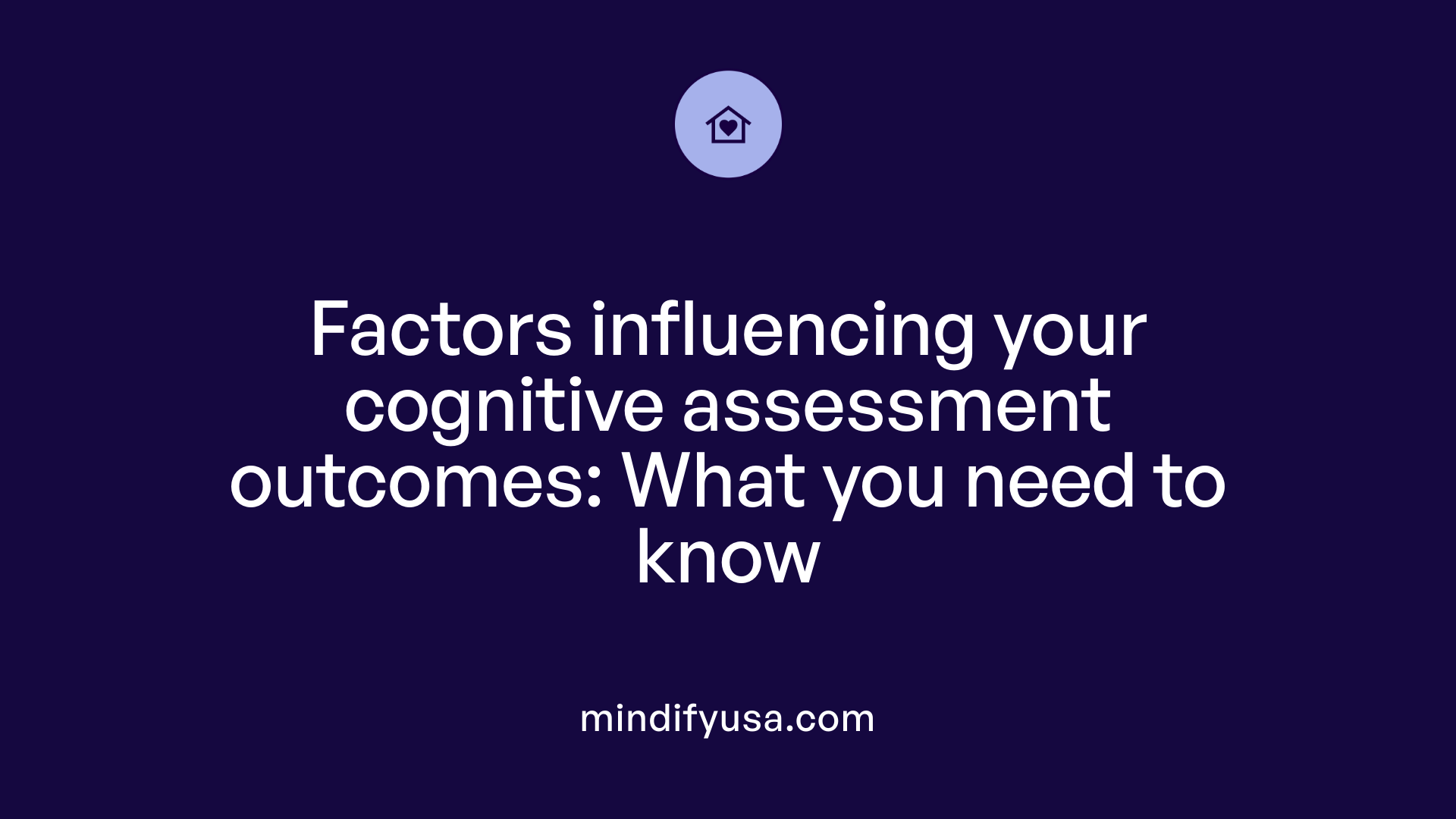
What factors can influence neuropsychological testing outcomes?
Several elements can affect the results of neuropsychological assessments. These include sleep quality, medication use, and mental health conditions. Poor sleep can impair cognitive functions such as attention, memory, and processing speed, leading to potentially misleading test results.
Untreated hearing loss or visual impairments can also impact performance, especially on tasks requiring communication or visual-spatial skills. Medications that influence cognition, mood, or alertness—such as sedatives or antidepressants—may alter test outcomes.
Mental health issues like depression and anxiety can temporarily hinder cognitive functioning, making it crucial to consider psychological states during testing. A comprehensive review of an individual’s medical history—including current health conditions, medication use, and psychological status—is vital to accurately interpret test results and avoid misdiagnosis.
Preparation for testing plays a significant role in optimizing outcomes. Ensuring adequate sleep, eating a healthy meal beforehand, and bringing necessary assistive devices like glasses or hearing aids can help individuals perform at their best.
It’s also important to recognize the limitations of neuropsychological testing. While these assessments provide valuable data about brain function, they do not directly diagnose medical conditions. Instead, test results need to be integrated with clinical evaluations, medical history, and other diagnostic tools.
Understanding these influencing factors and limitations helps healthcare providers and patients set realistic expectations and interpret results correctly. Proper preparation and comprehensive review ensure the most accurate assessment of cognitive health.
Additional considerations in cognitive evaluation
- The importance of a thorough medical history review
- Ethical considerations, including patient consent and confidentiality
- Limitations of neuropsychological assessments, such as cultural or language biases
- The importance of follow-up testing and ongoing monitoring
By considering these aspects, clinicians can deliver more accurate diagnoses and tailored interventions, ultimately supporting better patient outcomes.
Preparing for and Understanding the Testing Process
What does the neuropsychological testing process involve?
Neuropsychological testing is a detailed process designed to assess various aspects of brain function. It involves a series of tasks administered by trained professionals such as neuropsychologists or clinical psychologists. Usually, the process spans several hours and may take place over multiple sessions to ensure thorough evaluation.
Participants undergo questionnaires that explore aspects of mood and behavior, providing insights into emotional and psychological well-being. These are often complemented by clinical interviews where individuals discuss their medical history, current concerns, and daily functioning.
The core of the evaluation consists of standardized tasks. These activities may include writing, drawing, solving puzzles, or computer-based questions. They are carefully selected to measure different cognitive domains such as memory, attention, language, problem-solving, visual-spatial skills, and motor functions.
Preparation plays an essential role in obtaining accurate results. Individuals are advised to get enough sleep prior to testing days, eat a healthy meal to maintain energy levels, and bring any assistive devices they normally use, like glasses or hearing aids.
Overall, the process aims to produce a comprehensive profile of mental functioning, helping healthcare providers identify specific areas of strength and weakness. Such detailed information assists in diagnosing neurological or psychological conditions and guides appropriate treatment and support planning.
Post-Assessment Steps and Utilization of Results
What happens after the neuropsychological assessment?
Once the testing procedures are completed, a detailed report is prepared. This report consolidates the individual's cognitive, emotional, and behavioral test results, highlighting areas of strength and identifying potential challenges.
Healthcare providers analyze this information to develop personalized treatment and support plans. These may include therapies such as occupational therapy, speech therapy, or cognitive rehabilitation. Recommendations might also involve educational accommodations or workplace adjustments to help optimize functioning.
The assessment results are vital for determining a person’s decision-making capacity, safety considerations, and level of independence. In some cases, especially involving legal or forensic matters, the findings can influence decisions related to guardianship, driving eligibility, or other rights.
Follow-up evaluations are often scheduled to track changes over time, particularly in conditions that tend to worsen, like dementia, or in cases recovering from brain injuries.
The ultimate goal of post-assessment steps is translating test insights into practical strategies that enhance quality of life, support independence, and ensure appropriate management of cognitive and emotional health.
How are these findings reported?
Results are communicated through comprehensive reports reviewed with the individual and their family or caregivers. This report explains test outcomes in understandable language and offers specific recommendations.
Developing ongoing treatment or support plans
Based on the results, healthcare teams tailor interventions, therapies, and necessary lifestyle modifications. These plans are dynamic, often adjusted during subsequent reassessments, to reflect the individual’s progress or changes.
Importance of monitoring and reassessment
Regular follow-ups allow clinicians to monitor disease progression or recovery, assess the effectiveness of interventions, and make necessary adjustments. Such ongoing monitoring is especially important for progressive illnesses like Alzheimer’s or after neurological trauma.
Legal and decision-making considerations
In situations where mental capacity is questioned, assessment outcomes can help determine eligibility for decision-making rights or legal conservatorship. These evaluations provide objective data supporting or refuting claims about an individual’s cognitive functioning, guiding ethical and legal decisions.
Making Informed Decisions for Cognitive and Behavioral Health
Recognizing the signs that suggest your loved one may benefit from neuropsychological testing is the first step toward ensuring they receive appropriate care and support. These assessments provide invaluable insights into the workings of the brain, helping to diagnose, manage, and monitor conditions that affect cognitive and emotional health. If concerning symptoms such as memory loss, personality shifts, or difficulties with communication are observed, consulting with healthcare professionals about neuropsychological evaluation can lead to early intervention and better outcomes. Empowered with knowledge, families and caregivers can make informed choices to enhance quality of life and safety for their loved ones.
References
- Neuropsychological Testing: What It Is, Purpose & Procedure
- 9 Main Reasons For Neuropsychological Testing For Adults
- Understanding the Benefits of a Neuropsychology Evaluation
- Who Can Benefit from a Neuropsychological Assessment?
- Neuropsychological Evaluations in Adults
- What Is a Neuropsychological Evaluation? | 2024 | Blog
- What Is a Neuropsychological Evaluation in Disability ...





































































































